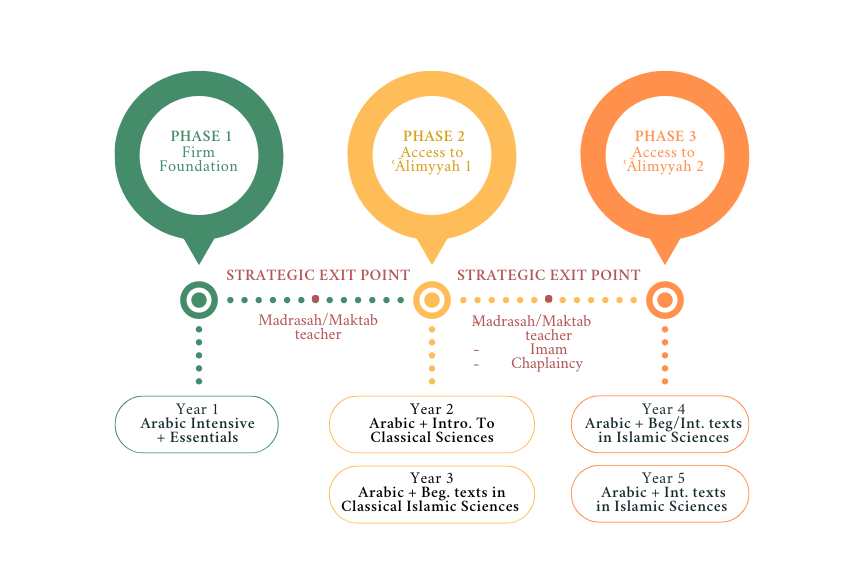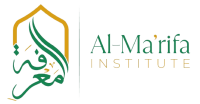Programme Aims
- To teach students key classical Islamic disciplines that constitute the bedrock of Islamic scholarship in accordance with the received tradition and methodological framework of mainstream scholarship.
- To nurture in the students deep-rooted Adab, love of sacred knowledge, and an active concern for the affairs of the Muslim community.
- To equip students with the intellectual and practical skills required to correctly understand and effectively convey the teachings of the Islam, while confronting the challenges of modern society.

Phase 1: Firm Foundations
- Arabic Language Studies: Students will be introduced to the study of classical Arabic focusing on the essential theories, principles and rules of word and sentence formation, syntactical analysis of basic to intermediate constructs, and building a basic vocabulary in preparation for reading curriculum texts in Arabic.
- Essential Islamic Literacy: Students will cover a basic curriculum, based on translations of classical manuals, covering the essentials of Tajwīd, the law of ritual worship and core aspects of Islamic beliefs. Students will also be introduced to the living tradition of sacred knowledge and scholarship in Islam, where they will be given an overview of the development, transmission, and preservation of the Islamic Tradition, as well as the etiquettes and methods of seeking sacred knowledge.
Phase 2: Access to ʿĀlimiyyah 1
- Arabic Language Studies: Building on the foundation set in phase 1, students will progress to studying separate texts in the core sciences of Arabic grammar, while reading literature in classical Arabic honing their application skills.
- Quranic Studies: Students will be introduced to core concepts & terminology of the Quranic sciences, while memorising select chapters that will be studied with basic commentary. The module will also provide a brief overview of discussions around the historicity of the Quran and its miraculous nature.
- Hadith studies: Students will be introduced to core concepts & terminology of the Hadith sciences, paired with a synoptic study of the authoritative centrality of Hadith, the history of Hadith compilation and an overview of canonical works. Select short but comprehensive Hadith (Jawāmiʿ al-Kalim) will be memorised and studied with basic commentary
- Sciences of Prophecy: This module introduces students to the life, times and blessed personage of the Prophet Muhammad ﷺ. As well as recounting key events from his life, the module will engage in a detailed study of his unique qualities, sublime character, and miracles. Special focus will be placed on drawing practical lessons the Prophet’s struggles, tribulations, decisions and his manner of engaging with the circumstances that affected him and his companions, while becoming spiritual intimate with his blessed being ﷺ.
- Spirituality & Ethics: This module introduces students to the key concepts, principles and frameworks that constitute the science of self-purification, Tazkiya. Students will be familiarised with the essential theory and core practices that constitute the bedrock of spiritual development and self-purification in the inherited tradition, covering selections from the works of early Masters.
- Legal Theory & Principles: This module introduces students to the highly sophisticated discipline of Islamic Legal Theory, or Usūl al Fiqh. Students will be given introductory insights into the legal philosophy and interpretative methodologies that underpin Islamic Law. Students will learn the principles and methods that are essential to the correct understanding, contextualising and interpreting of the Quran and Sunnah. This methodological framework is the cornerstone of mainstream Islam and the secret to its preservation from perversion.
- Arabic Language Studies: Having studied two beginner level primers in Arabic grammar up to this point, students will cover their first intermediate level manual of Arabic grammar from cover to cover, achieving proficiency in all the key discussions of grammar required for the remainder of the program. In their study of literature, students will be exposed to various genres in both prose and poetry.
- Hadith Studies: In this module students will be guided through a close reading of the short, yet comprehensive Hadith compilation, the Arbaʾīn of Imam al-Nawawī, with selections from multiple other classical and contemporary texts and commentaries. The module introduces students to the tradition of reading, memorising and studying Prophetic Traditions ﷺ. The module will focus on unravelling the language and eloquence of the Prophetic expression, while covering legal, creedal and spiritual themes, as well as prophetic etiquettes for daily life. Alongside the Hadith readings, students will be formally introduced the science of Hadith nomenclature and categorisation, consolidating, organising and building on year 1 content.
- Sacred Law & Jurisprudence: Having previously covered rulings related to Ritual Worship at a basic level, students will now progress to an intensive and comprehensive study of the Hanafi legal tradition, covering all the key topics of Islamic Law, from purification to bequests & inheritance. The module will comprise a study of a core classical manual from the Hanafi legal canon, with selected readings from several other texts and commentaries from the Hanafi legal tradition, highlighting the legal rationales, permutations and applications of rules.
Phase 3: Access to ʿĀlimiyyah 2
- Hadith Studies: Topic-based readings from a wide variety of classical and contemporary Hadith compilations. The module will focus on unravelling the language and eloquence of the Prophetic expression, while covering legal, creedal and spiritual themes, as well as prophetic etiquettes for daily life. Students will deepen their study of Hadith literature and nomenclature through the study of a core text, supplemented by key discussions from an array of commentaries, marginalia and parallel texts.
- Sacred Law & Jurisprudence: A continuation of year 2 phase 2, studying the Hanafi legal tradition, covering all the key topics of Islamic Law, from purification to bequests & inheritance. The module will comprise a study of a core classical manual from the Hanafi legal canon, with selected readings from several other texts and commentaries from the Hanafi legal tradition, highlighting the legal rationales, permutations and applications of rules.
- Legal Theory & Principles: Students will be guided through a core principial-text on Islamic legal theory according to the Hanafi school. Students will be introduced to the unique style of writing and expression employed by the Hanafi masters, while developing an appreciation for the sophistication and depth of the processes and mechanics at work in deriving legal rulings.
- Creedal Theology: Having learnt the essential creed of Islam in phase 1, students will now be formally introduced to the texts of classical Islamic theology. As with other modules at this level, study will primarily comprise of the study of a core classical manual of theology, supplemented by readings from commentaries, marginalia and other classical and contemporary texts of a similar level. Students will be trained in applying principles and modes of reasoning to both classical and contemporary theological & philosophical issues; including those that arise from within the Islamic theological spectrum, as well as those from without.
- Spirituality & Ethics: Based on select readings from the classics of Islamic spirituality and ethics, this module will give students a comprehensive overview of all the key discussion points in the field of Islamic psycho-spiritual development and ethics. The module will introduce students the science of purification, methods for identifying spiritual ailments, their signs and symptoms, and prescriptions for the treatment and transformation of such vices.
- Quran Studies: Building on the basic introduction to Quranic studies in year 1 of phase 2, in this module, students will study a short but comprehensive primer on the Quranic sciences, covering a broad array of discussion points, including the historical, the linguistic, and especially the exegetical. Students will be introduced in detail to the genre and types of Quranic exegesis, as well the fundamental principles and processes that govern the interpretation of the Holy Scripture.
- Hadith Studies: A continuation of year 2 phase 2, in which students will progress further and deeper with their topic-based readings, study and analysis of classical and contemporary Hadith compilations. Students will be introduced to the genre of ‘Legal Hadith’, exhibiting for them the sophistication and complexity of deriving rulings from Hadith.
- Arabic Language Studies – Rhetoric: Having studied their first comprehensive, beginner-intermediate level text in Arabic grammar in year 2 of phase 2, students will now be introduced to other core disciplines of the Arabic language. The focus here is on introducing students to the science of Balāgha, or rhetoric, in which they will be given a window into the essential beauty, eloquence and power of the Arabic language.
- Creedal Theology: Having begun the reading of key theological discussions from various classical texts in the previous year, this module will build on that by broadening the readings to previously untouched topics. There will also be greater engagement with philosophical and theological fault lines, enabling students to operationalise the principles, arguments and reasoning skills they have acquired.
- Spirituality & Ethics: Students will continue their readings of the classics of Islamic spirituality and ethics, while broadening the scope of the texts to introduce them to the various approaches and methodologies that have been employed by the masters of this science.
